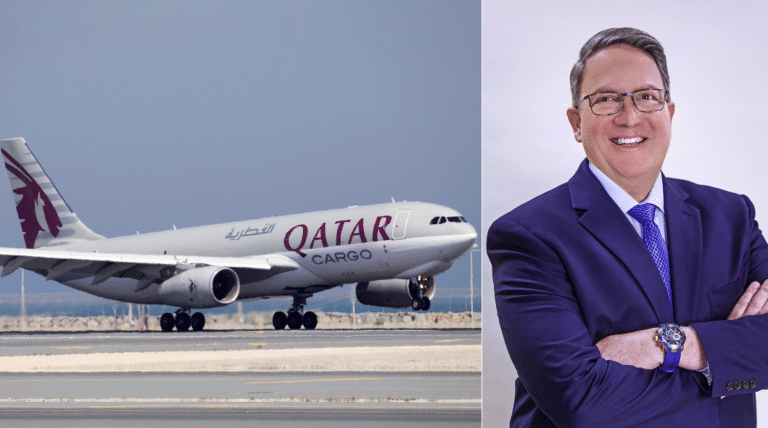Qatar Airways and its airfreight wing Qatar Airways Cargo have undergone leadership changes recently, bringing in a new leadership team to oversee its future growth. Stepping into the role of Chief Officer Cargo, Mark Drusch is looking at how to leverage and build on the strong foundation laid by his predecessors.
Speaking exclusively to Air Cargo Week, Drusch outlined several key priorities and challenges: fostering increased collaboration; accelerating the journey towards digitalisation; and further enhancing the airline’s commitment to sustainability.
Cooperation boosts cargo
While Qatar’s passenger and cargo operations are evolving, Drusch sees potential for substantial integration, working within his new role to ensure both sides are operating hand-in-hand. Having built a close bond with his colleagues at both the cargo and passenger side of Qatar Airways during his recent role with the company, Drusch is looking to bring that same kind of integration, input and communication into his new role.
“The passenger side is doing extraordinarily well, so my number one priority is very simple – further integrate us into the passenger side of operations.” Drusch stated. “Don’t get me wrong, the cargo team here is already working with the passenger side but there are ways to make it even more powerful.
“But there’s a lot of stuff we still don’t do well together that we should do to bring value to us as a company and to all of our customers.”
This cooperation extends beyond the internal operations, with QR Cargo looking to capitalise on the opportunity presented by teaming up with airlines across the globe. From Xiamen Airlines, expanding access to and from Mainland China, or DSV, opening a new US route, there are plenty of destinations QR Cargo is focused on growing its network.
“I want to focus on partnerships,” Drusch stated. “At Qatar Airways, I built all of our strategic partnerships with American Airlines, British Airways, Iberia, LATAM, Alaska Airlines and JetBlue.
“These bring massive, massive benefits to our customers and to the airline. It’s a win-win across the board, so I want to focus on building more partnerships for us in cargo.”
READ: Can drones reshape logistics?
Technology takes hold
Digital transformation is a key point of QR Cargo’s Next Generation project, with Drusch keen to accelerate this journey, recognising the value it brings.
For example, technological solutions in the cargo sector can provide visibility and transparency. Questions like whether it will arrive on time and if the temperature is being maintained are answered through efficient systems. This ability to track these details both allows carriers to make informed decisions and provides reassurance to customers.
“Passenger airlines globally understand the need to embrace technology but it’s just the beginning for the cargo sector,” Drusch stated.
“Our role, as the largest freight carrier in the world, is to lead that push for everybody, showing why it’s good for the airline, the customer and the industry, so we’ve got to do more of this, push it harder and be one of the leaders in understanding the impact and opportunity it offers.”
“We are on a great road to digitilisation. It delivers value to customers and allows us to find ways to increase our profitability, delivering more product more efficiently. Everybody wins when you use technology.”
READ: Qatar Airways Group Chief Executive elected to IATA Board of Governors
Committed to a green future
For QR Cargo, sustainability is a deeply emotional commitment. Personally engaged with the cause since the first Earth Day, Drusch isn’t coy about the scale of the challenge facing aviation.
While QR Cargo is committed to global initiatives and achieving carbon neutrality by 2050, the complex nature of making aviation sustainable requires concerted efforts from the entire industry and governments worldwide.
“Our ethos is that we are committed to sustainability. The challenge is how we will achieve it. There’s got to be a whole industry approach to this that works in cooperation with, not against government. Governments have to help us because we all want to do the same thing.
“We need to find those next steps, show those logical, economically focused steps. I am a person who likes to lead from the front, so to the extent we can lead from the front, we will do that,” Drusch explained. “We all want to be green and not destroy the planet, and, in fact, hopefully, help it regenerate.




